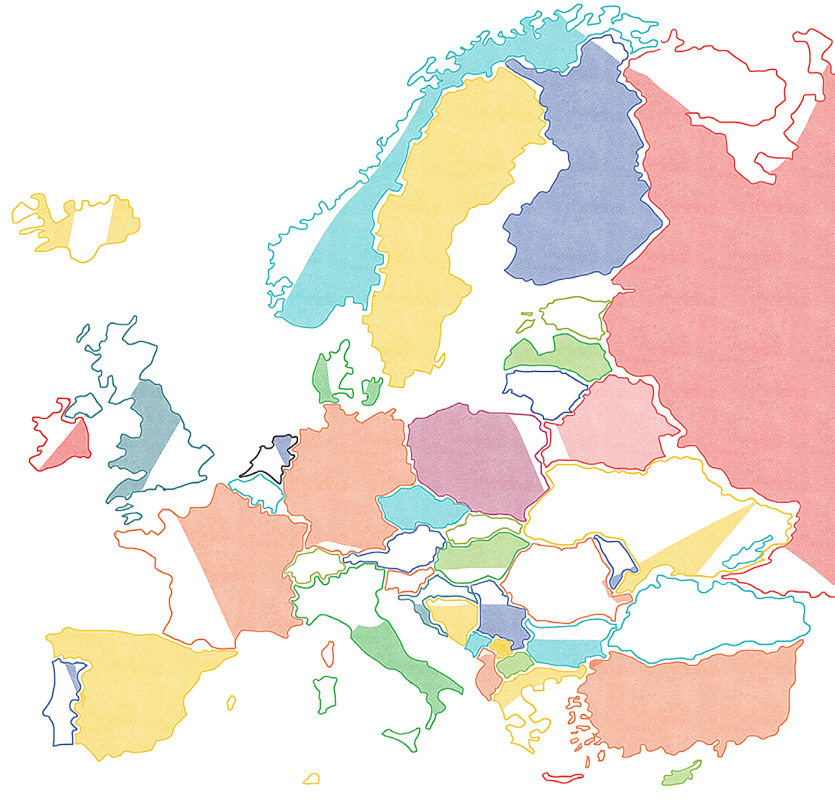Membership types
Members' work area
Country
Members' type of work
Member summary
- 189 results found
Description
Denis Neselovskyi
Denis started his career in the Refugee-Law-Clinic Bochum, as a legal consultant. He is the author of several articles published by the Human Rights League of France. Denis has been a delegate for ELSA international NGO in the committee on enforced disappearances. He graduated from the Strasbourg University as a Master of fundamental Rights. Since then he is pursuing his second Master degree in Human Rights and international humanitarian law at the Pantheon-Assas university in Paris.
Desyate Kvitnya (The Tenth of April)
“DESYATE KVITNYA” (“THE TENTH OF APRIL”) is an independent, humanitarian, non-governmental and non-profit organisation, which is based in Odessa, Ukraine. Our main goal is contributing to development of civil society and strengthening the rule of law in Ukraine. The Organisation was founded on August 01, 2012, and was named after the date of birth of the prominent Dutch legal scholar Hugo Grotius. The Organisation was created by the efforts of like-minded human rights activists with professional experience of over 10 years and a particular expertise in refugee rights protection.
The Organisation provides free legal aid and a limited scope of social assistance to such vulnerable groups as asylum seekers, refugees, internally displaced people, stateless persons and Roma people. The Ogranisation’s activities also include monitoring of human rights protection in Ukraine, cooperation with other stakeholders, and capacity-building actions. Our overall aim is solving the most challenging human rights problems.

Detention Action
Detention Action is a registered charity which challenges the dehumanising effect of immigration detention policy on migrants and asylum seekers in the UK. We defend the rights and improve the welfare of people in detention by combining support for individuals with campaigning for policy change. We work alongside people in detention both to seek their own release and to advocate for systemic change, enabling their voices to be heard. Formerly known as London Detainee Support Group, our volunteer visitors have given emotional support to people in detention since 1993. We work primarily in the Harmondsworth and Colnbrook Immigration Removal Centres. We adopted the new name of Detention Action in May 2011, reflecting our evolution from simply visiting detainees to initiating policy change.
Detention Action website
Diakonie Flüchtlingsdienst
The Austrian Diakonie Refugee Service works in the following areas: Counselling, care and support, housing and accommodation, Education and training, Integration and Medical and psychotherapeutic treatment with asylum seekers, refugees, migrants and Austrians alike. Working in eight Austrian states, through 45 facilities, with close to 700 employees and approximately 600 volunteers, Refugee Service supports its clients so as to achieve their equality of opportunity, self-determination and full societal participation. The Diakonie Refugee Service defines itself as a human rights organisation; its work centres on advocacy for refugees, asylum seekers and immigrants. We work actively to prevent racism and discrimination through training and projects. In our public relations and lobbying work, we advocate for the legal, social and economic equality of foreigners who are permanent residents in Austria and Austrians alike.
Diakonie Flüchtlingsdienst website
Dorota Pudzianowska
Dorota Pudzianowska graduated in law and sociology. Currently she is Associate Professor of Law at the Faculty of Law and Administration, University of Warsaw. She specializes in public law with special interest in human rights, law on nationality and statelessness and anti-discrimination law. In years 2006-2020 she worked at the Helsinki Foundation for Human Rights in Poland where she led strategic litigation of discrimination cases. Currently she works as an attorney (Warsaw Bar). She is a leading author in Poland on statelessness.
Equal Rights Trust
The Equal Rights Trust (ERT) is an independent international organisation, established to combat discrimination and promote equality as a fundamental human right and a basic principle of social justice. An advocacy organisation, resource centre and think-tank, ERT focuses on the complex and complementary relationship between different types of discrimination, developing strategies for translating principles of equality into practice.
ERT specialises in nationality and statelessness issues, recognising undocumented and stateless persons as particularly vulnerable to discrimination and prioritising the need to strengthen their protection. ERT’s statelessness work is global in scale, with a strong focus on particularly vulnerable stateless communities including the Rohingya of Myanmar. However, much of ERT’s research, advocacy, training, awareness raising and standard setting work is relevant to Europe. ERT’s engagement on statelessness has particularly focussed on the detention and discrimination of stateless persons.
Eric Fripp
Eric Fripp is a barrister practicing in asylum, immigration, and nationality work, and more widely in public law and human rights cases. He is cited as a Leading Junior in Chambers UK and the UK Legal 500 and listed in the Best Lawyers in the UK. A longstanding focus of his work concerns the interrelation of statelessness with international, European, and domestic laws concerning refugee status. Important past cases include ST (Ethnic Eritrean- nationality- return) Ethiopia CG [2011] UKUT 00252 (IAC) (deprivation of nationality by Ethiopia from 1998), MA (Ethiopia) [2009] EWCA Civ 289; [2010] INLR 1 (question not how claimant would be treated if returned to country of former nationality, but whether she faced exclusion which prevented her return), and EB (Ethiopia) [2007] EWCA Civ 809; [2009] QB 1, (1951 Refugee Convention covers adverse measures including, where a Convention reason arises, arbitrary deprivation of nationality and attached rights).
He is statelessness contact person for the Fahamu Refugee Resource Centre. He is the Editor (with Rowena Moffatt and Ellis Wilford) of The Law and Practice of Expulsion and Exclusion from the United Kingdom (Hart, 2014), and sole author of Nationality and Statelessness in the International Law of Refugee Status (Hart, 2016).
Erika Kalantzi
Erika Kalantzi past and current roles include Attorney-at-Law at the High Court of Greece 1990-1996: legal counselor at the Greek Council for Refugees 1998-3/2001: participation – representing UNHCR’s office in Athens - to second instance committee for the regularization of illegal migrants in Greece. 2000-2008: participation to second instance committees for the examination of submissions filed by rejected asylum seekers. 1998 till 2015: editing of the Yearbook of Refugee and Aliens Law (issued by the Publisher Ant. N. Sakkoulas in Greece).
European Roma Rights Centre
The European Roma Rights Centre (ERRC) is a Budapest-based international public interest law organisation established in 1996 and working to combat anti-Romani racism and human rights abuse of Roma through strategic litigation, research and policy development, advocacy and human rights education. The ERRC’s website includes research reports, the ERRC’s journal (Roma Rights), advocacy submissions sent to national, European and international bodies, and other materials about the ERRC’s work and Roma rights in general. The ERRC is currently litigating some 60 cases in domestic and European courts concerning Roma rights violations in eleven European countries.
At the moment, the ERRC is focusing on seven thematic priorities. Statelessness relates most closely to three of these: identity documents; women’s and children’s rights; and free movement and migration. The ERRC comes across Roma at risk of statelessness in all of its areas of work, particularly outside the EU and especially in Balkan countries. Stateless Roma (and Roma at risk of statelessness) often lack the documents they need to get healthcare, go to school, access to employment, travel across borders, or secure formal recognition of their family relationships. They tell us they feel invisible.
European Roma Rights Centre website

Eva Ersbøll
Eva Ersbøll is a lawyer, SENIOR RESEARCHER, EMERITA AT THE DANISH INSTITUTE FOR HUMAN RIGHTS. Formerly she worked as a legal assistant to the Danish Parliamentary Ombudsman and an analyst to the Commissioner of the Council of the Baltic Sea States on Democratic Institutions and Human Rights, Including the Rights of Persons belonging to Minorities. Her PhD is on Danish Nationality in an International and Historical Perspective. She has published on a number of other topics, including Union citizenship, nationality law in Europe, equality and non-discrimination. She has been working with statelessness for many years, in a national and Nordic context, and as a consultant for UNHCR.
Eva Ersbøll website